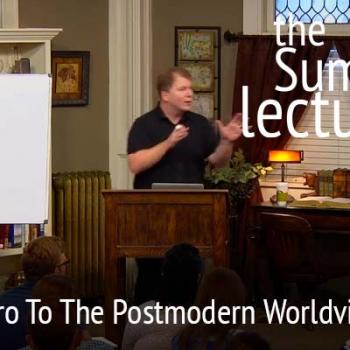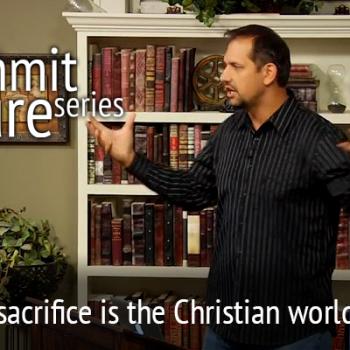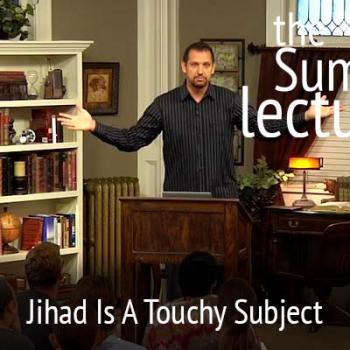
To purchase the entire DVD set of the Summit Lecture Series, visit summit.org.
During the month of Ramadan, Muslims fast (Saum) from sun-up to sun-down. This isn’t like most fasts where the person doesn’t simply eat food or drink water for a selected amount of time in order to draw closer to God or readjust their mindset and spirit as a form of worship.
For most Muslims, as soon as the sun sets, they go at it at the dining table. The same goes just before sunrise in order to get in their calories before daybreak. It’s also a huge social event. Families and friends gather at the evening meals (iftar). They also often feed the poor at iftar meals, and have incredible fun each night as they break their fast. In fact, it might be quite enlightening for Christians, if invited, to attend an iftar dinner at their Muslim friend’s home. Most Muslims actually enjoy having people over for these meals, so that they can share about their faith.
The fifth pillar of Islam, along with their Testimony of Faith (Shahadah), Ritural Prayer (Salaat), Giving of Alms (Zakaat), and Fasting (Saum), is the Pilgrimage or Hajj. All Muslims are commanded to make a pilgrimage to Mecca at least once in their lifetime. Interestingly enough, there are a lot of ancient pagan rituals that have been woven into Hajj, to the point where the whole pilgrimage has devolved into something of a pagan ritual itself, when viewed objectively.
While in Mecca during Hajj, millions of Islam’s faithful gather, join processions, and perform a series of rituals including each person walking counter-clockwise seven times around the Ka’aba (the cube-shaped building and the direction of prayer for the Muslims). In fact, even when they are not in Mecca, Muslims around the world bow down in the direction of the Ka’aba to pray. They even have compasses and phone apps that point them in the correct direction. During Hajj, so many millions of people gather in such a small space that annually, people are trampled to death at Mecca. One remarkable thing about this is that many Muslims believe that it is actually an honor to die by being crushed underfoot of other worshippers during Islam’s holy month – such an honor that dying during Hajj is one of two ways someone is all but guaranteed to go to heaven!
Now, Islam is a very duty-based religion. Essentially, according to Islam, if you do more good deeds than bad deeds, God will allow you into heaven. Where does grace enter in? Well, Allah can multiply your good deeds, if he wants to; and he can forget your bad deeds if he wants to, which can tilt the scales in your favor. But, fundamentally, Islam is still a works-based soteriology.
This is why the five “works” – Islam’s pillars that Allah wants his faithful to perform – are so important to Muslims.
Also very important in Islam is their doctrine. Especially their belief that there is only one god. This one god – Allah – is absolutely Unitarian. Now, keep in mind that the Christian faith had been teaching the concept of the Holy Trinity for several hundred years before Muhammad. So, Islam didn’t have it’s own version of God, but actually a formulated response to the Christian version of God. Ingrained in Islam’s version, and clearly written in the Quran is the belief that God cannot be part of a Trinity.
Additionally, beliefs in the “unseen”, or angels and demons, are highly esteemed and part of the Islamic Six Articles of Faith.
Muslims also believe that prophets have been sent to earth to deliver “the message” to the world. The Quran says:
We believe in Allah, and that which is revealed unto us, and that which was revealed unto Abraham and Ishmael and Isaac and Jacob and the tribes and that which Moses and Jesus received and that which the prophets received from their Lord. We make no distinction between any of them and unto Him have we surrendered. (Quran 3:84)
I find it very interesting that here, the Quran teaches no distinction between any of the prophets, yet in chapter 33, the Quran says:
Muhammad is not the father of any man among you, but he is the messenger of Allah and the Seal of the Prophets, and Allah is all aware of all things. (Quran 33:40)
Muslims take this to mean that Muhammad is the last of the prophets and the greatest of the prophets. He, then, has a special place amongst the other prophets – even those written about in Quran 3:84. Therefore, any literature or rhetoric you may hear that places Muhammad as an equal to Jesus Christ, Moses, Abraham or the other prophets is merely a front and not accurate to the Quran.
In fact, every practicing Muslim believes that Muhammad is THE greatest man who has ever walked the face of the earth. According to them, there is really no accolade that anyone could give Muhammad that he doesn’t deserve. He deserves all praises, as a man. He was the most generous man ever, the most merciful, the most loving, giving, humble, and wise man of all time. He was the best statesman, greatest military leader and much, much more.
This being said, you can see why any criticism of Muhammad goes completely against the grain for Muslims. Muhammad’s greatness is at the root of everything they have ever been told.
In Quran 33:21, Muslims are told to follow him. Quran 68:4 says his character is tremendous of an exalted standard. So, even within the pages of the Quran, we see the Islamic belief that Muhammad was a superior human to all others, including Jesus Christ.
















